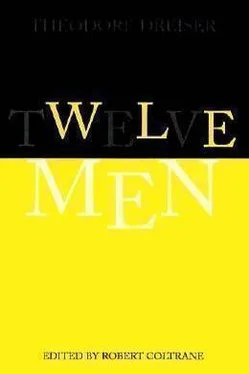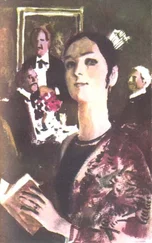Теодор Драйзер - Twelve Men
Здесь есть возможность читать онлайн «Теодор Драйзер - Twelve Men» весь текст электронной книги совершенно бесплатно (целиком полную версию без сокращений). В некоторых случаях можно слушать аудио, скачать через торрент в формате fb2 и присутствует краткое содержание. Год выпуска: 2014, Издательство: epubBooks Classics, Жанр: Биографии и Мемуары, на английском языке. Описание произведения, (предисловие) а так же отзывы посетителей доступны на портале библиотеки ЛибКат.
- Название:Twelve Men
- Автор:
- Издательство:epubBooks Classics
- Жанр:
- Год:2014
- ISBN:нет данных
- Рейтинг книги:4 / 5. Голосов: 1
-
Избранное:Добавить в избранное
- Отзывы:
-
Ваша оценка:
- 80
- 1
- 2
- 3
- 4
- 5
Twelve Men: краткое содержание, описание и аннотация
Предлагаем к чтению аннотацию, описание, краткое содержание или предисловие (зависит от того, что написал сам автор книги «Twelve Men»). Если вы не нашли необходимую информацию о книге — напишите в комментариях, мы постараемся отыскать её.
Twelve Men — читать онлайн бесплатно полную книгу (весь текст) целиком
Ниже представлен текст книги, разбитый по страницам. Система сохранения места последней прочитанной страницы, позволяет с удобством читать онлайн бесплатно книгу «Twelve Men», без необходимости каждый раз заново искать на чём Вы остановились. Поставьте закладку, и сможете в любой момент перейти на страницу, на которой закончили чтение.
Интервал:
Закладка:
He told me—Missouri—and some very few years before from its state university.
"And what is it you want to do?"
"What's that to you?" he replied irritatingly, with an ingrowing and obvious self–conviction of superiority and withdrawing as though he highly resented my question as condescending and intrusive. "You probably wouldn't understand if I told you. Just now I want to write enough magazine stuff to make a living, that's all."
"Dear, dear!" I said, laughing at the slap. "What a bravo we are! Really, you're interesting. But suppose now you and I get down to brass tacks. You want to do something interesting, if you can, and get paid for it. I rather like you, and anyhow you look to me as though you might do the things I want, or some of them. Now, you want to do the least silly thing you can—something better than this. I want the least silly stuff I can get away with in this magazine—genuine color out of the life of New York, if such a thing can be published in an ordinary magazine. Roughly, here's the kind of thing I want," and I outlined to him the probable policy of the magazine under my direction. I had taken an anæmic "white–light" monthly known as The Broadway (!) and was attempting to recast it into a national or international metropolitan picture. He thawed slightly.
"Well, maybe with that sort of idea behind it, it might come to something. I don't know. It's possible that you may be the one to do it." He emphasized the "possible." "At any rate, it's worth trying. Judging by the snide editors and publications in this town, no one in America wants anything decent." His lip curled. "I have ambitions of my own, but I don't expect to work them out through the magazines of this town; maybe not of this country. I didn't know that any change was under way here."
"Well, it is," I said. "Still, you can't expect much from this either, remember. After all, it seeks to be a popular magazine. We'll see how far we can go with really interesting material. And now if you know of any others like yourself, bring them in here. I need them. I'll pay you for that article, only I'll include it in a better price I'll give you for something else later, see?"
I smiled and he smiled. His was a warmth which was infectious when he chose to yield, but it was always a repressed warmth, cynical, a bit hard; heat chained to a purpose, I thought. He went away and I saw him no more until about a week later when he brought me his first attempt to give me what I wanted.
In the meantime I was busy organizing a staff which should if possible, I decided after seeing him, include him. I could probably use him as a salaried "special" writer, provided he could be trained to write "specials." He looked so intelligent and ambitious that he promised much. Besides, the little article which he had left when he came again, while not well organized or arranged as to its ideas or best points, was exceedingly well written from the point of mere expression.
And the next thing I had given him to attempt was even better. It was, if I recall correctly, a stirring picture of the East Side, intended to appeal to readers elsewhere than in the city, but while in the matter of color and definiteness of expression as well as choice of words it was exceptional, it was lacking in, quite as the first one had been, the arrangement of its best points. This I explained to him, and also made it clear to him that I could show him how if he would let me. He seemed willing enough, quite anxious, although always with an air of reserve, as if he were accommodating himself to me in this much but no more. He grasped the idea of order swiftly, and in a little while, having worked at a table in an outer room, brought me the rearranged material, almost if not quite satisfactory. During a number of weeks and months thereafter, working on one "special" and another in this way with me, he seemed finally to grasp the theory I had, or at least to develop a method of his own which was quite as satisfactory to me, and I was very much pleased. A little later I employed him at a regular salary.
It was pathetic, as I look at it now, the things we were trying to do and the conditions under which we were trying to do them—the raw commercial force and theory which underlay the whole thing, the necessity of explaining and fighting for so much that one should not, as I saw it then, have to argue over at all. We were in new rooms, in a new building, filled with lumber not yet placed and awaiting the completion of partitions which, as some one remarked, "would divide us up." Our publisher and owner was a small, energetic, vibrant and colorful soul, all egotism and middle–class conviction as to the need of "push," ambition, "closeness to life," "punch," and what not else, American to the core, and descending on us, or me rather, hourly as it were, demanding the "hows" and the "whyfors" of the dream which the little group I was swiftly gathering about me was seeking to make real.
It was essential to me, therefore, that something different should be done, some new fresh note concerning metropolitan life and action be struck; the old, slow and somewhat grandiose methods of reporting and describing things dispensed with, at least in this instance, and here was a youth who seemed able to help me do it. He was so vigorous, so avid of life, so anxious to picture the very atmosphere which this magazine was now seeking to portray. I felt stronger, better for having him around. The growth of the city, the character and atmosphere of a given neighborhood, the facts concerning some great social fortune, event, condition, crime interested him intensely; on the other hand he was so very easy to teach, quick to sense what was wanted and the order in which it must be presented. A few brief technical explanations from me, and he had the art of writing a "special" at his fingertips, and thereafter gave me no real difficulty.
But what was more interesting to me than his success in grasping my theory of "special" writing was his own character, as it was revealed to me from day to day in intimate working contact with him under these conditions. Here, as I soon learned, and was glad to learn, was no namby–pamby scribbler of the old happy–ending, pretty–nothing school of literary composition. On the contrary he sounded, for the first time in my dealings with literary aspirants of every kind, that sure, sane, penetrating, non–sentimental note so common to the best writers of the Continent, a note entirely free from mush, bravado and cant. He had a style as clear as water, as simple as rain; color, romance, humor; and if a little too much of vanity and self–importance, still one could forgive him for they were rather well–based. Already used to dealing with literary and artistic aspirants of different kinds in connection with the publications of which I had been a part, this one appealed to me as being the best of them all and a very refreshing change.
One day, only a few weeks after I had met him, seeing that I was alert for fiction, poetry and short essays or prose phantasies, all illustrative of the spirit of New York, he brought me a little poem entitled "Neuvain," which interested me greatly. It was so brief and forceful and yet so delicate, a double triolet of the old French order, but with the modernity and flavor of the streets outside, the conduit cars, hand–organs and dancing children of the pavements. The title seemed affected, seeing that the English word "Spring" would have done as well, but it was typical of his mood at the time, his literary adorations. He was in leash to the French school of which de Maupassant was the outstanding luminary, only I did not know it at the time.
"Charming," I exclaimed quite enthusiastically. "I like this. Let me see anything else you have. Do you write short stories?"
For answer he merely stared at me for a little while in the most examining and arrogant and contemptuous way, as much as to say, "Let me see if you are really worth my time and trouble in this matter," or "This sad specimen of alleged mentality is just beginning to suspect that I might write a short story." Seeing that I merely smiled most genially in return, he finally deigned to say, "Sure, I write short stories. What do you think I'm in the writing game for?"
Читать дальшеИнтервал:
Закладка:
Похожие книги на «Twelve Men»
Представляем Вашему вниманию похожие книги на «Twelve Men» списком для выбора. Мы отобрали схожую по названию и смыслу литературу в надежде предоставить читателям больше вариантов отыскать новые, интересные, ещё непрочитанные произведения.
Обсуждение, отзывы о книге «Twelve Men» и просто собственные мнения читателей. Оставьте ваши комментарии, напишите, что Вы думаете о произведении, его смысле или главных героях. Укажите что конкретно понравилось, а что нет, и почему Вы так считаете.









